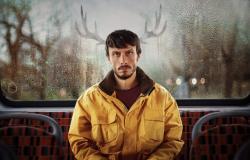The protagonist of “Novel without humans” Of Paolo Di Paolopublished by Feltrinelli and candidate for the 2024 Strega Prize sestina, is a professional historian who has dedicated many years to the study of an apocalyptic glaciation that for six months, in 1573swept through Central Europe and the Lake Constance, in northern Switzerland. In the last pages of the book Mauro Barbi, the protagonist, tries to tell what the lake can communicate today and to do so he quotes Rabelais: “In the most famous work of this great French writer of the sixteenth century, there is a moment in which Pantagruel feels the danger and runs away together with his companions. And while he flees, in delirium, he says that in certain countries, in winter, words freeze in the cold air, and it is not possible to hear them… […] now we need to understand if, by chance, this is not the place where those words thaw”.
More than a novel without humans, it is a book in which the protagonist is perhaps too human. In the midst of an existential crisis, Mauro Barbi he lets himself go to the thaw of all those thoughts, those words that he was unable to pronounce in the past, and he does so to reunite with some aspects of himself that he fears he has lost forever. That of Paolo Di Paolo, Roman, born in 1983, is a novel to discover what nothing of the past is lost: “I think that for the reader, whether he likes this book or not, it is very difficult not to be led to ask himself a question about what has been left unfinished with the others, overlooked”.
The interview with the author Paolo Di Paolo
From the first pages, thanks to the warning “This novel is not produced by artificial intelligence”, it mistakenly seems to be dealing with a dystopian novel. The book is titled “Novel Without Humans”, yet I have the impression that the protagonist of this story is all too human. What is the title due to?
“It’s true that the packaging of the novel – the title together with that warning – can create a sort of misunderstanding or in any case opacity, it’s something I had calculated. I knew perfectly well that I would give the sensation of a novel that concerns the non-human or post-human, but at the same time I thought not to give up that title because it had to do with a personal challenge: I wanted to see if it was possible to write a novel without human figures, I was fascinated by the size of this frozen lake that I had read about and which had fascinated me greatly. I said to myself: ‘If I wrote a book in which only the natural landscape exists, what would come out?’.”
And then?
“I knew from the beginning that it would be a failure project. You can try to describe a landscape devoid of human presence, a post-apocalyptic landscape, a prehistoric landscape, but there is still necessarily a reference to the human fact, to the gaze of man. And when I write at the beginning of the book ‘in the absence of human eyes’, if you think about it, is it possible? And so I left the provocation of the title and then contradicted it in the novel itself. Furthermore, two further readings of the title could be given. On the one hand, the fact that the character experiences his own season of solitude, and this solitude could be assimilated to a novel without other humans in his life. This is what loneliness is all about, isn’t it? On the other hand, we understand that it is the character himself who writes a book – at a certain point it turns out to be a sort of metanarrative where the parts on the sixteenth century are written by the protagonist – and this could give further meaning to the title.”
The protagonist is the historian Mauro Barbi and, in the midst of an existential crisis, he ends up behaving as if he were his own historian: he retrieves old emails, rediscovers old friendships, lost love… all those experiences that he didn’t live as he would have liked, above all we ask ourselves: what do others remember about us? Have you found an answer to this question?
“They remember what we often ignore about ourselves. What others retain, about our being or having been, is very often different from what we remember about ourselves. In this gap, between my memory of myself and the memory that others have of me, there is actually a quite abysmal vertigo. The character in the novel experiences all this in a very negative way, but I believe that there is also an element of positivity that perhaps he only understands towards the end of the book. You cannot govern the memory of others. As can happen in childhood: there is someone who witnesses our first years of life and remembers things about us that we don’t remember – family or friends – in some way those people are custodians of our memory. This can only enrich our memories, a bit like photographs. We cannot impose a memory but this sum of memories builds a much larger and more complex dimension than everyone’s memory.”
It would be a nice gift to give to friends, family, colleagues. Treat yourself to the memory that everyone has of each other…
“We should do it almost systematically. In relationships, in friendships… we should be better able to tell each other’s memories. Memory is so multifaceted, so evanescent that it lives on in completely elusive ways.”
Many chapters end without a period, the final sentence leaving the reader hanging until the next chapter. While reading, I was reminded of an article published in Limina Rivista, “In Italy there is no one left to talk to about literature”, in which he writes: “We must also dare as readers, not just trust what we have already seen and what has already been read. Be challenged.”
“I think about this first as a reader and then as a writer. It is a break that disorientates but at the same time leads the reader to move forward to the next page. Here, if this mechanism acts by producing a question about the structure, about the stylistic choices, this is decisive for me in the context of full adherence to a text.”
It is a choice that further explains the character of the protagonist who comes to terms with some aspects of his life left unresolved. It is part of his language, or not his language.
“Not only that, the time that he explores, passes through, imagines, fantasizes, remembers… is in any case a broken, suspended time. Added to this is also the idea that that distant sixteenth century can only be a time broken by the present, in the present.”
And which novels were a challenge for you while reading?
“I am very attached, indeed I would say obsessed, with some novels of the so-called modernist period, with books that change the structure of the novel. I think of ‘The Waves’ by Virginia Woolf, or Joyce. But also ‘Mrs Dalloway’ and ‘To the Lighthouse’, also by Virginia Woolf, but I could also say ‘The Sound and the Fury’ by Faulkner or ‘La Recherche’ by Proust, ‘The Great Gatsby’ by Fitzgerald: all that galaxy of books that essentially came out in the 1920s and that changed a way of designing the book, from a narrative point of view. I still remember the first reading of ‘Mrs Dalloway’: I went to high school and perhaps I didn’t understand many things, but I really remember the feeling of being assailed, enveloped and dazzled by those choices, by those narrative and stylistic solutions. I realize that ‘Novel Without Humans’ suffers greatly from that type of experimentation. There is a chapter that is playfully called ‘Hello Proust!’ which is not directly linked to Proustian issues, in this sense the reader who has never read Proust is not unprepared, but the protagonist finds himself in a hotel room and thinks about an erotic episode from his life. The very fact that he is remembering it as if it were a memorial recovery of a Proustian nature reveals that there is a non-explicit link to that type of literature. Here, this is the galaxy of books that have shaped me as a reader and that in some way influence me as a writer.”
In an old post on Facebook, however, he wrote: “I think that – in the age of TripAdvisor – the real challenge of a reviewer is – starting from the assumption of understanding something – not so much to criticize (which is easy and fun) but rather to argue, to connect , delve deeper, seek a horizon of meaning before judgment.” A reflection that, a year later, continues. In a letter published in Domani, ‘There is no escape from dissatisfaction as writers’ he writes: “In the crowd, we give the impression of no longer having much to say to each other”. What of a certain type of literature do you miss?
“It is not so much the literature itself that I may lack, but I lack the articulation of a reasoning that is not crushed by judgement. Talking about literature, or more generally about artistic endeavor, is more difficult for me today because it seems to me that even the most equipped people are rather inclined to close conversations or in any case reduce the sentence to two poles: this thing is beautiful or this what is horrendous, and in the middle we are desertifying the fascinating possibility of a debate. We should instead try to tackle that work – literary, artistic, cinematographic, any form of human expression – by asking ourselves questions: how many questions did this book, this work, raise in me? What did not convince me, what determined in me? Or because it leaves me indifferent?”





